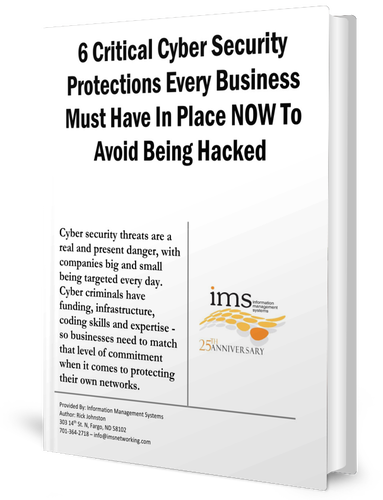
Is Your Out-of-Office Reply Handing Hackers the Keys?
The prairie sun stretches long and warm, and you're ready to trade spreadsheets for shorelines. But as your suitcase fills, your inbox quietly starts sharing information you'd never dream of handing to a stranger at the gas station.
"Hi there! I’m out of the office until [date]. For urgent matters, contact [coworker’s name and e-mail].”
This isn’t just polite housekeeping. It’s the digital equivalent of leaving your front door ajar with a neon sign flashing: Nobody’s home.
Why Fargo/Moorhead Small Medium Businesses (SMBs) Are at Higher Risk
In our region, businesses thrive on trust, tight-knit teams, and a healthy dose of Midwest humility. But that same culture can be a sweet spot for hackers:
- Office managers in South Fargo are juggling payroll, scheduling, and IT fire drills.
- Construction firms in Moorhead often rely on a single admin to handle everything from invoices to vendor emails.
- Healthcare clinics in West Fargo might have rotating staff covering inboxes without clear boundaries.
This creates the perfect conditions for phishing attacks and business email compromise (BEC) scams.
How the Scam Usually Unfolds
- Your auto-reply goes out.
- A cybercriminal learns who’s gone and who’s in charge.
- They send a fake request—from you or your backup—asking for a wire transfer or login credentials.
- Your team, overwhelmed and trusting, complies.
- You return from vacation to find $45,000 sent to a scammer.
Sound dramatic? Sadly, it's all too common—especially when leadership teams travel or delegate inboxes to assistants without strict guardrails.
5 Steps to Stop Hackers from Exploiting Your Auto-Reply
1. Keep it Short & Generic
Leave out the details. Avoid naming who’s covering or why you’re gone.
Better version:
“I’m out of the office and will respond upon my return. For urgent matters, contact our main line at [main contact info].”
2. Train Staff to Pause Before They Pay
Educate your team:
- Never respond to urgent financial requests via email alone.
- Always confirm strange requests via a second method (like a quick call or Teams message).
3. Use E-mail Filters That Actually Work
Spam filters are not enough. You need:
- Anti-spoofing tools
- Phishing detection
- Domain impersonation protections
4. Turn On MFA Everywhere
Multifactor authentication (MFA) is like locking both your front door and your safe. Don’t leave accounts vulnerable with just a password.
5. Have a Local IT Partner Who Monitors, Not Just Reacts
A proactive partner (like the ones Fargo businesses rely on) can flag:
- Unusual login attempts
- Suspicious email behavior
- Weak spots before they become disasters
Vacation Should Feel Like Peace, Not Panic
Cybercriminals don’t take summers off. But with the right tools, training, and a trusted IT team, your inbox doesn’t have to become a liability while you're out sipping lemonade on the lake.
Want to feel safe stepping away?
Let’s lock down your systems before your next trip.
👉 Book a FREE Discovery Call and give your team (and yourself) peace of mind.



